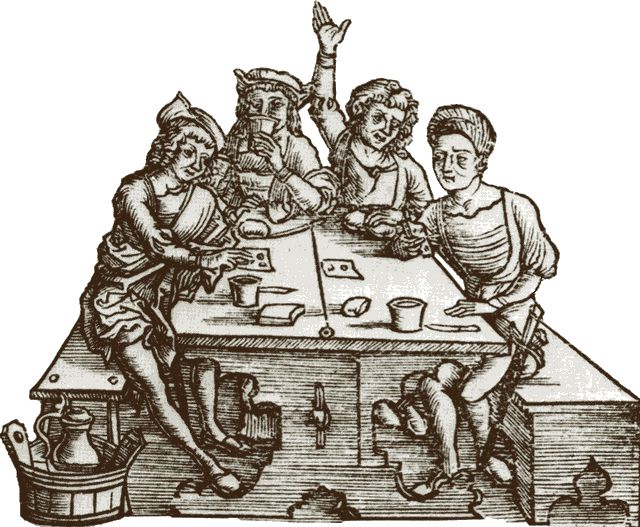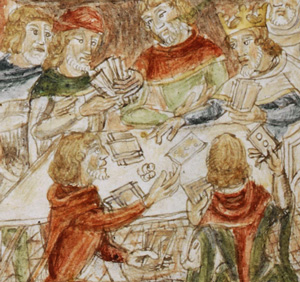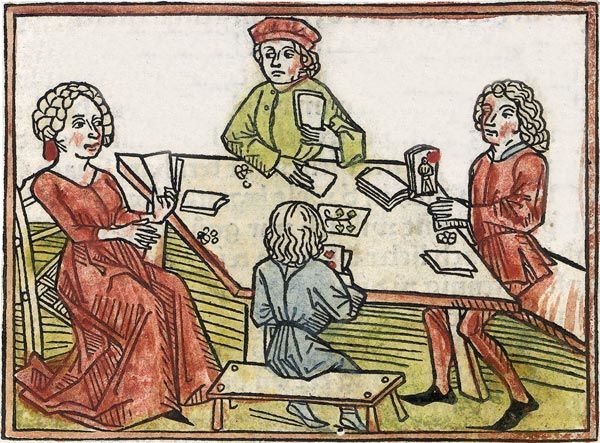Francis Willughby was a mid-seventeenth century naturalist and academic, known for his treatises on fish (Historia Piscium) and birds (Ornithologia), and his modern scientific approach to classifications of said animals, which was an influence on later scholars like Linaeus. Although it was incomplete at the time of his death at age 36, and not published until 2003, his Book of Games is one of the key sources on late period English games. Describing many games of the period, including ball games, card games, children’s games, and sport games, Willughby groups and classifies as he did in his other works, and presents us with an excitingly comprehensive work. Jeffrey L Forgeng, Dorothy Johnston, and David Cram transcribed and analyzed the unfinished manuscript, including details about Willughby and the context it was written in. The below reconstruction is possible thanks to their work.

The setup and deal
Beast is a trick taking game for four (or more, see below) players. Play uses a standard deck of 52 cards. Players should have a modestly generous set of counters or coins to wager with.
Everyone puts two coins into the pot except the dealer who puts in three. The dealer deals out 5 cards to each person, then turns over the top card of the deck. The suit of the revealed card is trump. The dealer has the option to take the revealed card if they have not yet looked at their hand of cards. They then look at their hand and discard back down to five cards. If they choose to do this, they are considered to have declared as well, as described below.
The declaration round
Now comes the declaration round. Starting on the dealer’s left and going clockwise, each person is given the opportunity to pass or to declare “I Play”, becoming the declared Player, and indicating they believe they have a winning hand (see “Playing the Hand”).
If no one declares themself the Player, the hand is not played and the deal passes to the left. The new dealer adds a coin to the pot, and deals a new hand.
Once someone has declared themselves the Player, each other person is given a chance to declare “I Counter”, naming themselves the Counterer. Declaring as the Counterer means that they believe they can win the hand over the Player. Note that someone who previously passed on being the Player can declare themselves the Counterer.
Only one person may be the Player, and only one may be the Counterer, but the others might play to win as well! Remember, if the dealer chose to take the revealed trump suit card, they are automatically declared the Player.
If a person can guarantee winning the hand (such as by having the A,K,Q of trump in their hand of cards, see “Playing the Hand”), this is called a demonstration, and the person may show their demonstration and claim the pot. They may choose to wait to see if another declares themself the Player first, and then trap them by declaring to be the Counterer and showing the demonstration.
Playing the Hand
Once the declaration round has ended, the eldest player (the person to the dealers left) begins the first trick. As with other trick taking games, as the play goes around clockwise, each player must follow the suit of the card led if they are able to. If they are found not playing the led suit when they could, the penalty is to match the pot. If they cannot follow suit they may play any card they choose. Highest card of the suit led wins, unless a trump card is played, in which case the highest trump card played wins. Whoever wins the trick leads the next one.
Whoever wins the most tricks wins the hand. If there is a tie for the most, whoever got there first wins the hand. For example, with a five card hand, the first person to three tricks wins the hand, or the first person to two tricks, if no one gets three.
- If the Player wins the hand, they take the pot, and the next hand starts with everyone putting coins into the pot again as at the start.
- If the Player loses the hand, they must match the pot, putting in as many coins are currently in it.
- If the Counterer wins the hand, they collect the pot after the Player has matched it, and the next hand starts with players putting coins into the pot as above.
- If the Counterer also loses the hand, they must also match the pot.
This means that if both the Player and Counterer lose the hand, the pot is tripled. Only the Player or the Counterer can win the pot; if another player wins the hand, the pot remains for the next hand.
This means the pot may grow rapidly before it is won. Because of this, it may be strategic to not declare, or to play carefully such that neither the Player nor Counterer can win the hand.
Playing with more than four
More than four may play, but the number of cards dealt should always be the number of players plus one, so that at least one person is guaranteed to win a majority of tricks.

Symon of Barnesdale is a member of the SCA, in the East Kingdom’s Barony of Carolingia. He is the Jack of the Low Company, a regular gathering to learn and play period games.
